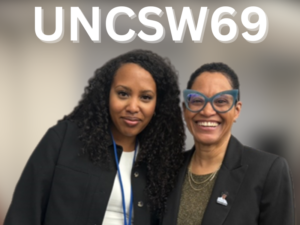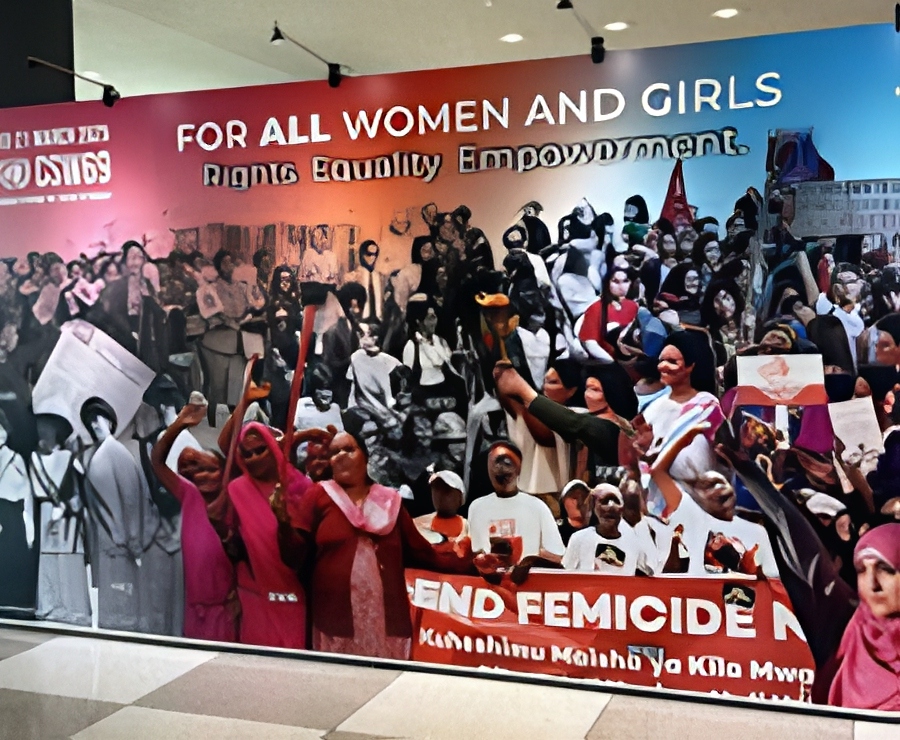Attending UNCSW69: a journey of connection, reflection and advocacy

Attending the 69th Session of the United Nations Commission on the Status of Women (CSW69) in New York was nothing short of transformative. There are many challenges facing women, especially women who are migrants. Yet there is an energetic and powerful community of change-makers around the world leading change. As a first-time participant, I found myself in an environment surrounded by people with great visions and stories, and deep-rooted solidarity among advocates from all around the world. While the days were packed and sometimes overwhelming, they were also filled with learning, inspiration, and meaningful connections. Truly an experience to remember for a lifetime!
One of the most impactful sessions I attended was the parallel event on Empowering Migrant Mothers: Providing Critical Education Pathways for Young Children. This conversation resonated with me deeply, as it unpacked the emotional and developmental challenges children face during forced migration, especially when their parents are also enduring trauma. This event reminded me of the importance of centering women, especially migrant mothers, in conversations around children’s rights and well-being.

African Caucus: Climate, Migration, and the African Experience
Through the NGO CSW/NY-sponsored African Caucus, I had the opportunity to engage in dialogues on migration, climate change, and how these two issues are intricately linked. Hearing from African advocates reaffirmed the urgent need to integrate climate justice into migration discourse, as communities across the continent are already experiencing the brunt of climate-induced displacement. There was a deeply moving moment during CSW69 when all the attendees were invited to hold a moment of silence in honour of the fallen African sisters who lost their lives to gender-based violence, migration struggles, and systemic injustices. This pause was very powerful because it allowed us to reflect, mourn and recommit to the fight for justice and liberation.

Building connections at the Canadian Delegates Reception

I was grateful to be invited to the Canadian Delegates Reception hosted by the Minister for Women and Gender Equality and Youth and the Permanent Mission of Canada. It became a space to hear the future plans of Canada as well as an opportunity for networking and connecting with fellow Canadians who are equally passionate about gender justice. I left the evening feeling more grounded, knowing that there is a growing community within Canada that is committed to this work.
Storytelling Circles: Reclaiming Narrative Power
The Storytelling Circles: Breaking Barriers Through Shared Narrative event could not have come at a better time. With my plans of encouraging migrant workers in Canada to share their stories, it reminded me that storytelling is not just art — it is advocacy. Listening to youth, including speakers like Thamyris Elpidio, share how they have used stories to resist, heal, and mobilize, inspired me to reflect on how I can strategically amplify the voices of migrant workers.

Resilience and Empowerment: Learning from Judge Carolyn H. Nichols
A standout moment for me was attending Resilience and Empowerment: Transformative Approaches on Gender-Based Violence for Refugee and Migrant Women, where I met Judge Carolyn H. Nichols. Her insights on child reunification with migration-affected families, alongside her reflections on legislative shifts in the U.S. and their global ripple effects, offered a critical perspective. This session not only expanded my understanding of cross-border challenges but also strengthened my belief in the power of judicial and community-based advocacy.

Women in Migration Network: Voices from the Ground
Hearing directly from migrant women and advocates in Nepal, the Philippines, and across the Middle East, Latin America, and Canada during the Women in Migration Network event was humbling. Their testimonies marked 30 years since the Beijing Platform for Action, highlighting both the progress made and the persistent struggles that migrant women face globally. Their courage, honesty, and determination reminded me of my why-the reason I do the work that I do.

ACT Alliance Side Events and Debriefs: Reflection and Strategy
The ACT Alliance side events and debriefs were some of the most enriching parts of my CSW69 experience. The side events offered critical insights into the intersections of migration, gender justice, and advocacy while highlighting practical, community-rooted approaches to addressing these challenges. From panel discussions to knowledge-sharing sessions, ACT Alliance consistently created spaces where the realities on the ground were centered. Equally valuable were the debriefs, which provided a much-needed space for reflection. In the whirlwind of CSW69, these gatherings allowed me to slow down, process what I was learning, and engage in honest dialogue with fellow advocates, mentors, and peers from around the world.

Meeting Minister Lesego Chombo: A Personal Highlight

One of the most inspiring encounters I had was meeting the Honourable Lesego Chombo, Botswana’s Minister of Gender and Youth Affairs at the Permanent Mission of Botswana. As the youngest woman minister in Botswana and across Africa, her presence at CSW69 was a powerful testament to youth leadership. Our brief connection left me energized and believing more than ever that young women can and should hold positions of power.
Youth Solidarity Across Borders
CSW69 was not just about formal events — it was about the informal moments, too. I had the pleasure of meeting youth advocates from across the African Union, other parts of the Global South, and beyond. We shared notes, meals, and dreams. By the end, we had built an entirely new network — one that will undoubtedly continue beyond CSW69.
Deep Gratitude to ACT Alliance and Mentors
I would not have navigated CSW69 without the guidance and support of ACT Alliance, who provided me with accreditation, mentorship, and a genuine sense of belonging. A special thank you to Rachel, Simon, and Allison, who generously shared their wisdom and made sure I never felt alone amid the whirlwind of the conference.
Lessons from CSW and why they matter to Canada
CSW reaffirmed that while the challenges to gender equality and migrant justice are vast, so too is the community fighting for change. For Canadians, this work is not just international-it is deeply connected to our own realities. Canada is home to countless migrant women and girls who face the same barriers discussed globally: precarious immigration status, gender-based violence, climate displacement and inequitable access to service. As a country that values diversity, human rights and inclusion, it is our responsibility to ensure that these values are reflected in our policies and practices. Taking this work further means listening to migrant workers, advocating for pathways to permanency, and pushing for stronger gender-responsive policies both at home and internationally. By Leah Shifferaw, Migrant Justice Team Lead
